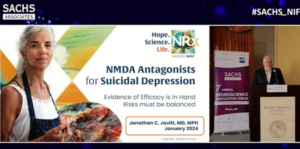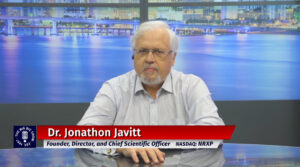I recently received the letter below from a shareholder. The correspondence from them (taken exactly from their email) and my response regarding our next steps for ZYESAMI ® (aviptadil) can be found below.
Email from R.B., a shareholder of NRx Pharmaceuticals
Dear Dr. Javitt
I have been heartbroken since the denied emergency approval for Zyesami/Aviptadil. I believed so strongly that a drug had finally been found that would give the seriously ill a chance. However, I do not understand the FDA’s rejection. Surely the safety concerns are completely false because multiple studies have established the safety of the body’s own peptide? So did we really see the biggest placebo effect?
Thank you for your clarifying answers.
Kind regards from R.B., a loyal shareholder of NRXP from the beginning.
Jonathan’s Response:
Dear R.B.,
Most certainly, we are not done. We are certainly disappointed. We believe that our medicine offers a chance at life to those with COVID-19 respiratory failure who have exhausted all currently approved therapies.
FDA has expressed a commitment to working with us and to reviewing additional data as it is presented. We will continue with our application for New Drug Approval under the Accelerated Approval pathway based on biomarker results. Please see FDA’s guidance for Accelerated Approval and note that FDA has already awarded Fast Track designation https://www.fda.gov/drugs/information-health-care-professionals-drugs/accelerated-approval-program.
FDA has previously agreed to allow rolling review of our application (a component of the Fast Track program) so that elements such as CMC, manufacturing, and non-clinical safety and toxicology can be reviewed in advance of reviewing efficacy data. Should the ongoing ACTIV-3b and/or I-SPY trials produce positive results prior to the PDUFA date for the Accelerated Approval application, that application may be converted to a traditional New Drug Application.
The US Government has invested considerable resources in the ongoing ACTIV 3-b and I-SPY trials to test ZYESAMI® (aviptadil) both against placebo and remdesivir, as Dr. Fauci has testified from the White House and before Congress and as Dr. Collins (Director of the NIH) has advised the public in the recent NIH FDA workshop. Dr. Collins said that of 750 drugs initially by NIH, only 22 remain under study. ZYESAMI is one of those remaining drugs listed on the slide that Dr. Collins showed. The US Government, via NIH, BARDA, and DOD, has made a substantial scientific and financial investment in two trials under separate FDA INDs designed to demonstrate whether ZYESAMI improves the likelihood of surviving and recovering from COVID-19 respiratory failure. The decision to make that investment by Dr. Fauci and others was made after a detailed review by NIH of our data, including unblinded data from within the AVICOVID trial with special permission of our independent Data Safety Monitoring Committee. We were actually not able to see the data that NIH was allowed to see at the time NIH decided to invest in ACTIVE-3b because we were still blinded at that point. FDA has asked for more data, large federally-supported trials are underway to generate those data, and we are committed to delivering those data and other information that may emerge to FDA as quickly as we can.
We, together with some of the nation’s leading statistical consultants and regulatory law firms, believe we have demonstrated that ZYESAMI is safe and meets the legal standard of “May be Effective.” The FDA does not agree that the legal standard has been met based upon the data FDA has reviewed so far. Our path forward is to bring the FDA more data. We are determined to satisfy the regulatory requirement and continue to believe that we will do so. That said, any trial can fail, no matter how likely we believe it may be to succeed. Remember that if a trial is conducted at a study power of 80% (the common standard), there is a 20% chance that the trial will fail to detect efficacy, even if the drug is actually effective. That’s what statisticians call a “Type II error.” You can easily demonstrate that to yourself at home. Pick up a die that has the number one on it. You know that if you throw the die 6000 times, it will almost certainly come up “one” on 1000 of those throws. However, if you throw the die six times, it may or may not show you a one on those six throws. Clinical trial statistics are based on similar principles and probabilities cannot be confused with certainties.
We will continue to supply FDA with additional data in support of drug approval for ZYESAMI. We do not believe we saw the “world’s biggest placebo effect” because the 2-fold increased odds of survival for patients treated with ZYESAMI was observed in a placebo-controlled, double-blind study. I made that comment in an interview about “the world’s biggest placebo effect” before we had randomized, placebo-controlled data, and at the time, I was commenting on the dramatic survival and recovery benefit seen in the Houston Methodist open-label study. You may review the information from our trials in our Breakthrough Therapy Designation request posted on our website and form your own conclusions.
Biotechnology development has extraordinary potential to save lives but also has well-known risks, as disclosed in our public filings.
Thank you for following our journey.
Jonathan
Cautionary Note Regarding Forward-Looking Statements
This announcement of NRx Pharmaceuticals, Inc. includes “forward-looking statements” within the meaning of the “safe harbor” provisions of the US Private Securities Litigation Reform Act of 1995, which may include, but are not limited to, statements regarding our financial outlook, product development, business prospects, and market and industry trends and conditions, as well as the company’s strategies, plans, objectives, and goals. These forward-looking statements are based on current beliefs, expectations, estimates, forecasts, and projections of, as well as assumptions made by, and information currently available to, the company’s management.
The company assumes no obligation to revise any forward-looking statement, whether as a result of new information, future events, or otherwise. Accordingly, you should not place reliance on any forward-looking statement, and all forward-looking statements are herein qualified by reference to the cautionary statements set forth above.



